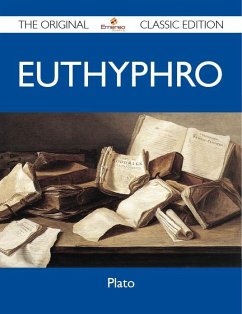Euthyphro is one of Platos least important works philosophically and probably not meant as a representation of the historical Socrates, but it is still worthwhile. One should certainly read Platos more famous works first, but those interested in him will want this, and it is a good place to begin exploring his presentation of Socrates. The fact that it is widely anthologized -- e.g., in The Trial and Death of Socrates -- makes it hard to justify a standalone, but some may be taken by the translation.
The dialogue examines the important What is piety? question and, like many Platonic dialogues, does not have anything like a definite conclusion. Some find this aspect frustrating, and it is certainly beguiling, but those who have experience with it come to love it. Like Socrates, Plato is after all too intelligent to give hard and fast answers; in all likelihood, he knows there are not any. What he does is far more important - lead us to think for ourselves and come to our own conclusions if we can. Euthyphro is a good, if relatively minor, example. It also introduces what philosophers call the Euthyphro Problem; here it is Are good things good because they are loved by the gods, or are they loved by the gods because they are good?, but it has been restated in innumerable forms. This is in some ways an unrepresentative dialogue and thus an unfortunate one to begin the book, because it seems to prove the stereotype that philosophy obsesses over inane, probably unanswerable questions of no practical use. The Euthyphro Problem seems truly asinine as given - or, in our post-postmodern world, simply irrelevant. However, we can begin to see its importance when we replace good and loved by the gods with whatever seems most pressing. Such is after all the kind of thing Plato wanted; we are not supposed to read in narrow literal terms but use him as a starting point for our path to wisdom.
This is an instructive example of how Plato has been immensely influential far beyond his apparent significance.
The dialogue examines the important What is piety? question and, like many Platonic dialogues, does not have anything like a definite conclusion. Some find this aspect frustrating, and it is certainly beguiling, but those who have experience with it come to love it. Like Socrates, Plato is after all too intelligent to give hard and fast answers; in all likelihood, he knows there are not any. What he does is far more important - lead us to think for ourselves and come to our own conclusions if we can. Euthyphro is a good, if relatively minor, example. It also introduces what philosophers call the Euthyphro Problem; here it is Are good things good because they are loved by the gods, or are they loved by the gods because they are good?, but it has been restated in innumerable forms. This is in some ways an unrepresentative dialogue and thus an unfortunate one to begin the book, because it seems to prove the stereotype that philosophy obsesses over inane, probably unanswerable questions of no practical use. The Euthyphro Problem seems truly asinine as given - or, in our post-postmodern world, simply irrelevant. However, we can begin to see its importance when we replace good and loved by the gods with whatever seems most pressing. Such is after all the kind of thing Plato wanted; we are not supposed to read in narrow literal terms but use him as a starting point for our path to wisdom.
This is an instructive example of how Plato has been immensely influential far beyond his apparent significance.
Dieser Download kann aus rechtlichen Gründen nur mit Rechnungsadresse in A, D ausgeliefert werden.


